
Recent Reviews by Rahul Desai
The Hollywood Reporter India
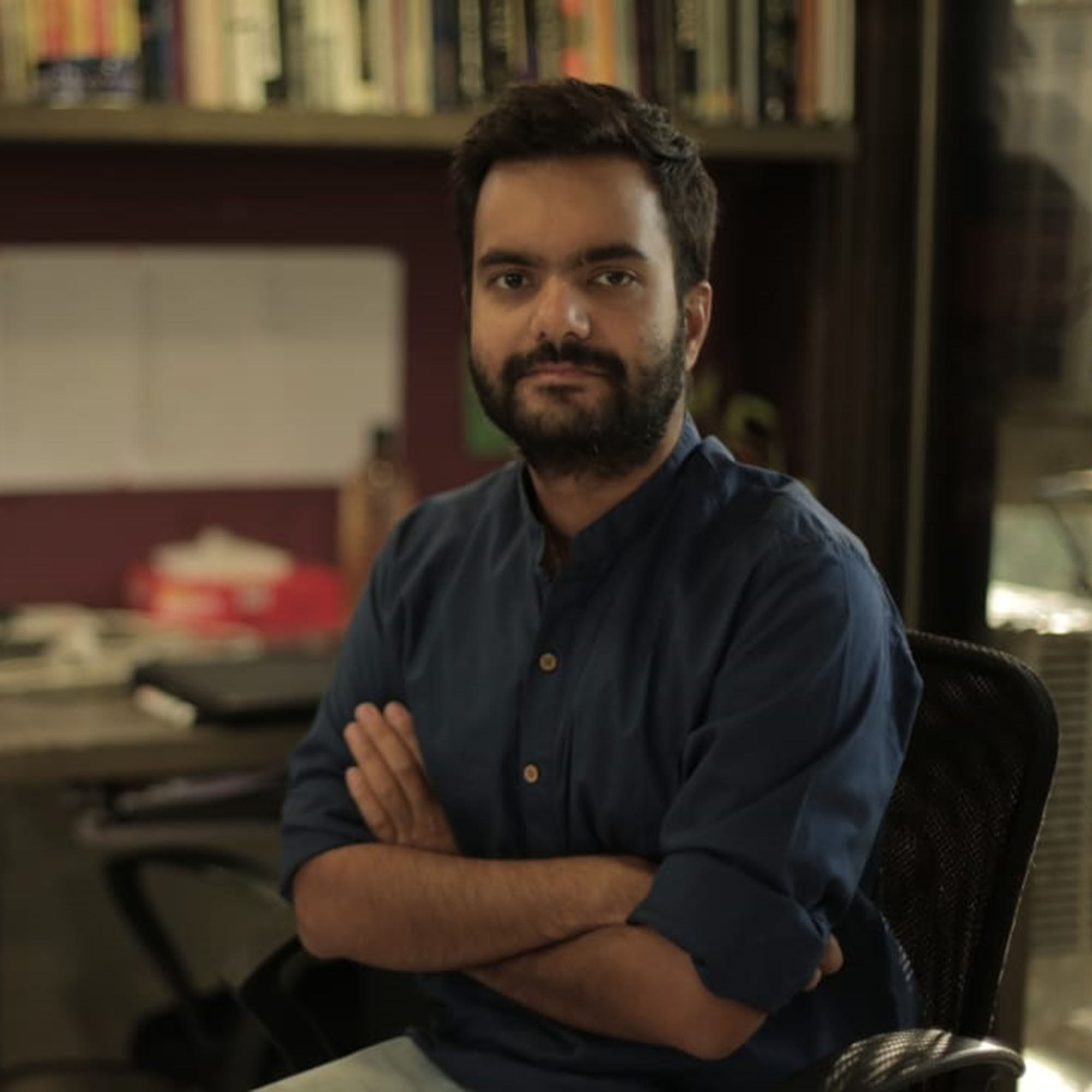
A film critic and columnist, Rahul Desai writes for The Hollywood Reporter India and OTTPlay. In his spare time, he runs a weekly movie podcast called IIF.
Films reviewed on this Page
Companion
Kuch Sapney Apne
Mere Husband Ki Biwi
Oops! Ab Kya
Dhoom Dhaam
Chhaava
Bobby Aur Rishi Ki Love Story
Anuja
Sweet Dreams
Sky Force
Companion (written for OTT Play)

When Artificial Intelligence Is The Only Intelligence
We often use the term 'human' as a moral antithesis to beasts and machines, but Companion is one of the few modern fables that shows how in fact ‘human’ might have been the derogatory state all along.
EARLY ON in Drew Hancock’s Companion, two young women named Iris (Sophie Thatcher) and Kat (Megan Suri) have a prickly moment on a boozy night. When Iris asks why Kat — a close friend of Iris’ new lover Josh (Jack Quaid) — doesn’t like her, a tipsy Kat says she just doesn’t like the ‘idea’ of her. “You make me feel replaceable,” she continues. The conceit of this confession is two-pronged. Iris is deeply in love with her new boyfriend Josh, but Kat is in an abusive relationship with a controlling Russian man; the obvious implication is that Kat is bitter. But the real implication emerges a scene or two later, when the film reveals that Iris (“Siri” when spelt backwards) is actually a companion robot. Up until then, it speaks volumes that the average male viewer may not be able to tell. Iris loves Josh so much that she is subservient to him — she wants to please him by hanging out with his friends on a weekend getaway, she craves to see him smile, and sex for them is basically Josh grunting and rolling over to sleep. It’s all too familiar. So Kat saying she feels “replaceable” by Iris is the film admitting that — in a world captured by the male gaze — a woman robot is no different from a woman.
Kuch Sapney Apne
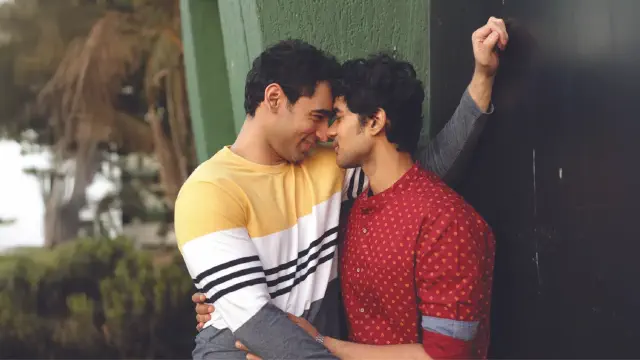
Sincerity of Queer-Themed Drama Undone by Weak Craft
Directed by Shridhar Rangayan and Saagar Gupta, 'Kuch Sapney Apne' embraces the euphemism of being an ‘important film’ rather than a solid one
Some movies break your heart when they’re not good. A chunk of filmmaker-activist Sridhar Rangayan’s filmography — which focuses on queer subjects and LGBTQ-themed stories — falls into this category. The chasm between intent and execution is as wide as the chasm between fact and fiction in Hindi historical biopics. Distinguishing between the two is important; criticising the craft of a film is not the same as panning its cause. If social significance alone were a yardstick for meaningful cinema, Rangayan’s latest (co-directed and co-written with Saagar Gupta), Kuch Sapney Apne, would be the Love Actually of the genre. A sequel to his previous feature, Evening Shadows (2018), Kuch Sapney Apne expands its multi-narrative snapshot of an orthodox South Indian family at the crossroads. The conflict is now married to its consequences.
Mere Husband Ki Biwi
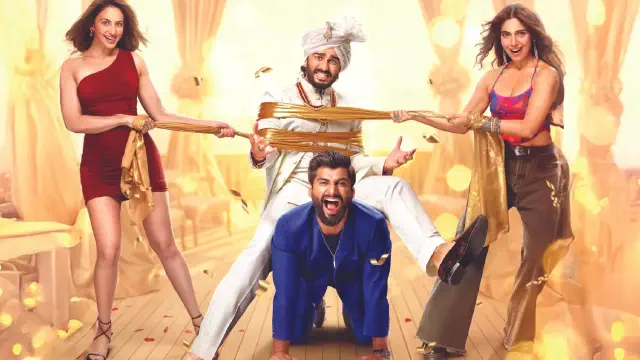
Eat, Sleep, Run-of-the-mill Romcom, Repeat
Starring Arjun Kapoor, Bhumi Pednekar and Rakul Preet Singh, Mudassar Aziz’s latest love triangle lacks newness and charisma.
Mere Husband Ki Biwi is such a generic and run-of-the-mill North Indian production that if it were edible, it’d be a half-crispy aloo paratha for breakfast. If it were a person, it’d be Rocky Randhawa (without the self-awareness) from Rocky Aur Rani Kii Prem Kahaani. If it were an emotion, it’d be the entitled rage of drivers at the Delhi-Gurgaon toll plaza. If it were a place, it’d be a breezy mustard field — but only as a painting in an upscale art gallery. I can go on, but you get the gist. It looks like every other entry in the genre: glossy, distant, intermittently alive but ultimately soulless. At least it’s environmentally conscious, because it recycles a whole book of tropes: the wise-ass best friend played by a comedian; a lustful Shakti Kapoor character; a quirky voice-over starting the film but disappearing after the introduction; an Amritsari girl who addresses her husband by either his surname, yaar, baby or baby yaar; a love triangle between a Chaddha, a Dhillon and a Khanna where two of them spend an entire half secretly competing with each other for the ‘prize’; a dozen slow-mo shots of them walking towards, past or away from each other with contempt and pride; an overseas almost-wedding; and so on and so (un)forth.
All 9 reviews of Mere Husband Ki Biwi here
Oops! Ab Kya

Watchable but Uninspired Remake of 'Jane the Virgin'
Starring Shweta Basu Prasad, the eight-episode comedy is a middling fusion of tones.
Fortunately, the worst thing about Oops! Ab Kya? is its title. The eight-episode series is an Indian remake of Jane the Virgin, the hit American dramedy centered on the life of a chaste Latina virgin who becomes pregnant after a routine hospital visit turns into an artificial insemination accident. Oops! Ab Kya? (if I repeat this title enough, maybe it’ll stop sounding terrible) is a serviceable show on its own. It has a decent cast: Shweta Basu Prasad finally gets an author-backed role of sorts, while the supporting gang is gamely led by veterans like Sonali Kulkarni and Jaaved Jaaferi. The young-and-awkward Dice Media aesthetic lends itself naturally to the show’s unserious tone. For once, the artifice and DIY stagey-ness of its setting aren’t deal breakers. And it helps that the original show aims beyond its one-line gimmick: every character becomes a protagonist of their own little storyline. There’s not much to tell the main dish from the garnish.
All 2 reviews of Oops! Ab Kya here
Dhoom Dhaam
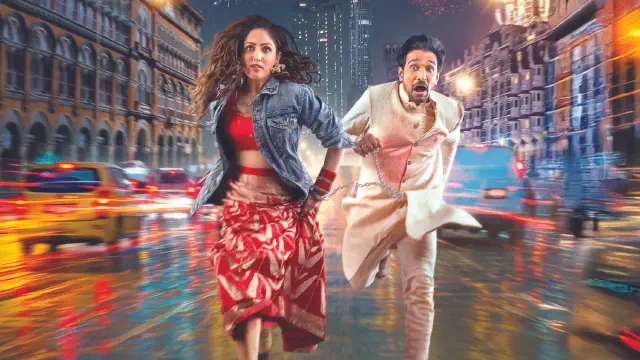
A Dysfunctional Marriage of Genres
Starring Yami Gautam Dhar and Pratik Gandhi, 'Dhoom Dhaam' stays glued to the middle lane.
Hindi cinema can be middling in two ways. The first way is common — a movie settles for mediocrity despite a decent idea. The second way is not as common — a movie strives for mediocrity when the idea gets greedy. Dhoom Dhaam somehow manages to uphold both ways at once. It’s disappointing because it could’ve been better, but it’s also fine because it could’ve been worse. The one thing that’s undeniable, however, is the conveyor-belt nature of the modern streaming picture. Every time it threatens to be enjoyable, a peculiar factory-produced tone emerges. The story here is a romantic comedy: Mr. Chalk and Ms. Cheese have an arranged marriage only to belatedly discover their differences. They’re nothing like the eligible partners their families “advertised” them as. The more they learn about each other, the more complicated it becomes. Hidden faults jump out; either they’ll fall for each other or fall apart. The USP of Dhoom Dhaam is that this entire marital journey — which might take years or decades in the real world — is condensed into 24 chaotic hours featuring shady cops, possible gangsters, a masked robbery gone wrong, a mysterious package called Charlie, a horny dog, a kidnapped uncle, and a bunch of chases and escapes across Mumbai. In short, the cross-cultural romcom is accelerated by the black comedy.
All 9 reviews of Dhoom Dhaam here
Chhaava
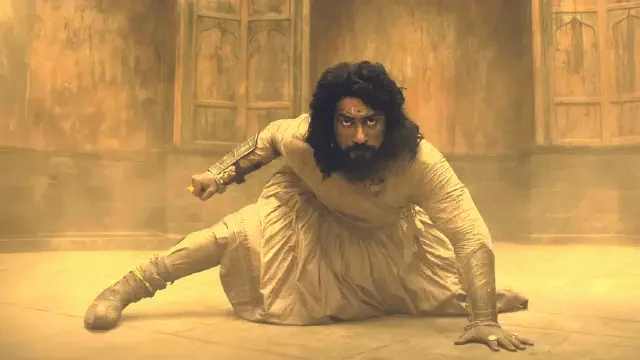
A Roaring Tribute to Bad Film-making
Starring Vicky Kaushal as a 17th-century Maratha king, 'Chhaava' has the personality of a deer in headlights
At its worst, the Tour de France turned moral decay into a non-factor. Doping among Lance Armstrong-era cyclists was so normalised that, perversely, the sport became a level-playing field. The logic being: if everybody cheats, is it even cheating anymore? It’s simply about who cheats — or performs — the best. The Bollywood period biopic is in a similar position today. It goes without saying that history and mythology are used as pawns to checkmate old-school notions of secularism. It goes without saying that the game being played is more modern. ‘Hidden’ themes like Islamophobia, bigotry, propaganda, erasure and jingoism are so normal that we barely notice them anymore. It’s the default pitch; that’s why “keeping the politics aside” is a common phrase. The irony is that, unlike the cyclists, such movies are so fundamentally broken that nobody wins. Cultural doping makes it a level-playing field of mediocrity and delusion. It’s like watching them race not to the finish line but straight off the top of a mountain. And not just any mountain, Mount Everest itself. Why stop there?
All 17 reviews of Chhaava here
Bobby Aur Rishi Ki Love Story

The Death of the Hindi Romcom
Director Kunal Kohli returns with a Hum Tum-shaped debacle.
I’m running out of polite ways to say that most Bollywood launch vehicles are vanity vans parading as commercial movies. I’m running out of impolite ways to say that most Hindi rom-coms feature nepotism hires and Gen Z characters who speak like outdated youngsters at a debutante ball imagined by out-of-touch boomers. I’m also running out of ways to say that I’m running out of ways. Kunal Kohli’s Bobby Aur Rishi Ki Love Story looks like it was written in 1995, shot in 2005, scored in 2015, edited in 1985, colour corrected in 1975 and released in 2025. Remember the annoying animated couple from Kohli’s hit, Hum Tum (2005)? Those two were still more realistic and less cringey than the live-action couple in this film, who do the walking-and-talking-in-Europe (or post-Brexit Britain) jig as if Dilwale Dulhania Le Jayenge and Before Sunrise were in-flight tourist videos rather than classic landscape changers. They start as enemies, become frenemies and turn into screechy soulmates — all with the artistic spirit of a paid vacation and the emotional awareness of an oblivious meme.
Anuja
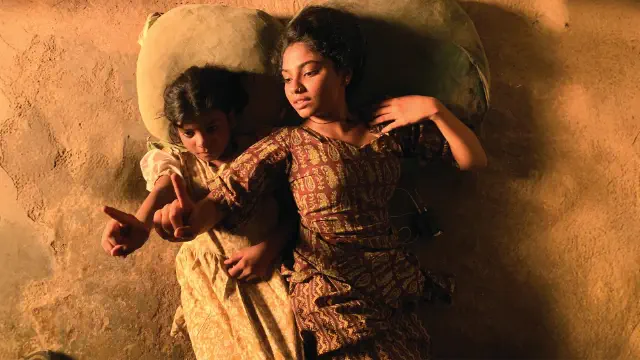
Classic Oscar Bait, Little Substance
The Oscar-nominated live action short film greedily panders to the western gaze.
On paper, Anuja is a noble project. It’s made in association with Salaam Baalak Trust, a Delhi-based non-profit organisation that supports street kids. It stars one of its children, Sajda Pathan, as a gifted nine-year-old garment factory worker who is conflicted between earning a livelihood and getting an education. It’s an Indian American production. It is backed by diaspora-global celebrities like Mindy Kaling, Priyanka Chopra Jonas and Guneet Monga Kapoor. And it’s about spirited orphans in a big bad world. Which is to say: Anuja is so noble that it’s only a project. At its best, it’s a creative presentation slide. At its worst, it’s less of a short film and more of a look-poor-people-hungry-people aesthetic. It brings back memories of the famous and infamous Slumdog Millionaire (2008) — and not in a good way.
All 3 reviews of Anuja here
Sweet Dreams

A Promising Love Story Ruined By Instagram Film-making
The over-designed romcom, starring Amol Parashar and Mithila Palkar, wastes a dreamy premise
Sweet Dreams has a sweet premise. It begins with a J.R.R. Tolkien quote, setting the stage for a fantasy-coded romcom. And it opens with a dreamy date between a flirty Diya (Mithila Palkar) and the cool Kennith (Amol Parashar) at a cafe. We soon learn that this is a shared dream between two strangers — a recurring habit for both — leading completely different lives. Kennith, an influencer and recycle artist, is newly single and he speaks to his psychiatrist (Faye D’Souza; a surprise-but-meek cameo) about this mysterious girl he keeps meeting in his dreams. He’s convinced she exists. Diya, a career drifter who writes and sings, is in an autopilot relationship with Ishant (Meiyang Chang); she, too, is baffled by how real and tangible her dreams feel. The film follows their attempts to find each other and (re)unite.
All 3 reviews of Sweet Dreams here
Sky Force
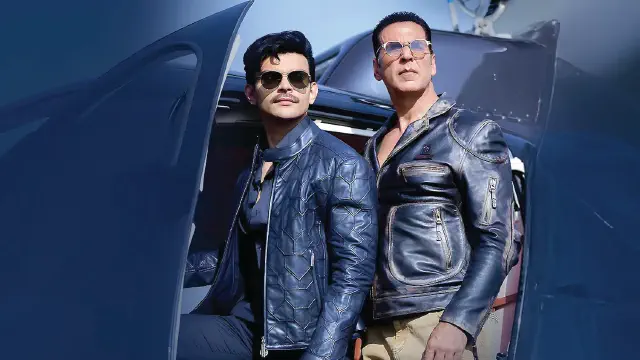
Akshay Kumar Hijacks A One-way Flight To Nowhere
Inspired by the unique story of two Indian Air Force (IAF) officers, ‘Sky Force’ succumbs to the fictions of today
There are two ways to be disappointed with Sky Force. One, through the lens of its creators. Up until now, the production company Maddock Films — on a high following the dizzying success of its horror-comedy multiverse — has managed to innovate and stay interesting without conforming to mass trends and jingoistic patterns. It’s worth noting that Sky Force is its first real foray into this zone. But within the contours of the herd-mentality move, it tries something different. It chooses to dramatise a real-life story that’s equal parts war movie and investigative drama.